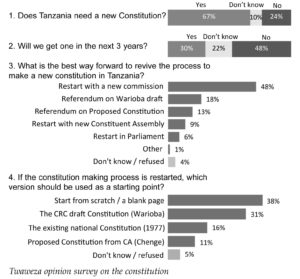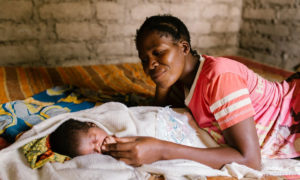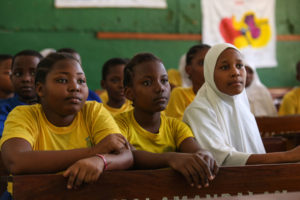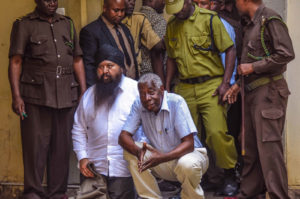by Martin Walsh
POPOBAWA: TANZANIAN TALK, GLOBAL MISREADINGS. Katrina Daly Thompson. Indiana University Press, Bloomington and Indianapolis, 2017. viii + 228 pp. (paperback). ISBN 9780253024565. $30.00.
In Zanzibar and Dar es Salaam, the sites of Thompson’s research, there have long been stories of a mysterious shape-shifter called Popobawa (literally ‘bat wing’) which attacks people at night, mostly men but sometimes women, by sodomising them with its enormous penis. Such purported attacks can lead to panic and people seeking protection either by sleeping outside in groups or by recitation of the Koran, or both. Popobawa stories are not only recounted in Tanzania but have spread to other parts of Africa and beyond, including to a global audience interested in the supernatural.
In this book, Katrina Daly Thompson, Professor of African languages at the University of Wisconsin, who describes herself as a linguistic ethnographer, discusses her own research in the form of a series of interviews she conducted in 2009, as well as the available research of other people, academic or otherwise. One of her main arguments is that the telling of these stories need to be understood in a social context, with some knowledge of who is speaking as well as what they say. The failure of many outside commentators, including academics, to recognise this, is heavily criticised by the author. Single, overarching theories (meta-discourses) such as those which seek to explain the periodic panics in terms of political events are rejected. Thompson rather uses discourse theory to discuss the Popobawa stories at both the local and wider level, suggesting that understanding the meaning of the telling of the stories is rarely simple. Tellers of the tales may distance themselves, may claim to be sceptics, may claim to be authoritative. In short, people adopt different subject positions in their talk.
Thompson argues that the recounting of the stories, whether told seriously or in the form of jokes, breaks with local ideas about restraint and decorum, particularly in matters of sexuality, gender segregation and Islamic prohibitions on gossip. For these reasons, talking about Popobawa allows discussion around forbidden subjects such as male homosexuality or female sexual desire without apparently challenging them directly. It may thus be seen as subversive and solves the problem of customary silence on certain important matters. At the same time, such talk, with its many-layered meanings, fits with the way in which the Swahili language itself is most highly valued by its speakers, namely when it is allusive, full of metaphors and double-entendres – Kiswahili ndani (‘inside Swahili’).
In the latter part of the book, Thompson turns her attention to the global influences on the local: many Zanzibaris are well aware of western legends like Dracula and Batman, and capable of incorporating them into their own highly cosmopolitan culture. She also considers the ‘readings’ of Popobawa in films, tv programmes, websites and social media, even guide books, mainly produced outside of Tanzania, and particularly in the West. The tendency of most western commentators is to reduce the complexities of Popobawa to simple meta-narratives with single explanations. Here the trap of ethnocentrism looms large: the premise is that westerners are rational and scientific, Africans are the antithesis of this. So there is a danger that a purported interest in and discussion of the phenomenon ends up confirming stereotypes about Africa and Africans.
Thompson thus argues that there is actually no difference between local speakers and western commentators since both recount the Popobawa legends for their own purposes. In her conclusion, she quotes one of her interviewees: ‘Popobawa yuko, kila mmoja anamchukulia anavyotaka’ (‘Popobawa is there, everyone interprets him as they like’).
This book provides a salutary case study for other ethnographers who might be tempted to take refuge in the simplistic, as in ‘some people say’. Thompson argues convincingly that ethnography must be dialogic and that the ethnographer should resist the temptation to impose his or her own authority, comments with which one can only agree. At the same time, I was left wondering: who was she for them? What did her interlocuters make of a white American, married to a Zanzibari, engaging in this particular topic of research?
Pat Caplan
Pat Caplan is Emeritus Professor of Social Anthropology at Goldsmiths, University of London. She has carried out research on Mafia Island, Tanzania since 1965 and written several books and articles about the area.
MIKIDADI: INDIVIDUAL BIOGRAPHY AND NATIONAL HISTORY IN TANZANIA. Pat Caplan. Sean Kingston Publishing, Canon Pyon, 2016. viii + 191pp. (hardback). ISBN 978-1-907774-48-5. £50.00
Pat Caplan has been prominent in the anthropology of the Tanzanian coast since the publication of Choice and Constraint in a Swahili Community (1975), based on her doctoral fieldwork in Mafia Island in 1965-67. Her reputation as an insightful interpreter of Swahili society and culture became firmly established through numerous scholarly publications exploring kinship and descent, land tenure, gender, health, socialism, modernity, and other topics.
One notable book was African Voices, African Lives: Personal Narratives from a Swahili Village (1997), an account of the lives of members of a Mafian family, presented largely through their own (translated) words. Like Marjorie Shostak’s Nisa: The Life and Words of a !Kung Woman (1981) and Sarah Mirza and Margaret Strobel’s Three Swahili Women: Life Histories from Mombasa, Kenya (1989), it can be read as an attempt to ‘decolonise’ anthropological writing, that is, to let the subjects speak for themselves rather than to present their beliefs and experiences entirely through the anthropologist’s powerful theoretical lens.
Caplan’s latest book, Mikidadi: Individual Biography and National History in Tanzania, can be viewed as a further probe in this direction. Published first in a Swahili language edition (2014) and now in English, it tells the story of Mikidadi Juma Kichange, a Mafian whose lifetime spanned the colonial era, Independence, Ujamaa socialism, neoliberalism and the (still ongoing) transition to multi-party democracy. Mikidadi was both ordinary and extraordinary. His background and achievements were modest, and the values and beliefs he held were representative of his society. Yet he was unusual in his intuitive understanding – while still a boy – of Caplan’s anthropological endeavour, and also in the stubbornness of his drive to better himself, his relatives and his community.
The book is a gut-wrenching tale of thwarted ambitions and missed opportunities. At the same time, it is a profoundly hopeful story of survival, compassion, staying true to one’s principles and transcending cross-cultural barriers. It comprises excerpts from the sizeable correspondence between Caplan and Mikidadi that accumulated in the four decades before his death, supplemented by diary entries, interview transcripts and field notes. In between, Caplan puts the material in historical, cultural and personal context. She does not try to make herself invisible in this account, but instead transparently considers her role in Mikidadi’s life and that of the larger community. Nor does Caplan burden the reader with anthropological analyses that would use Mikidadi’s words and experiences merely to illustrate academic theory.
As Caplan explains, her priority in retirement is to disseminate what she has learned over many years to a wider audience that includes non-specialists as well as the subjects of her research. With that aim, she has produced a website about Mafia and participated in making documentary films for general audiences. Mikidadi is another product that aims to make Caplan’s work accessible to non-anthropologists, not least Mafians. The book hints at the challenges this involves. For example, when visiting Mafia, it had been Caplan’s practice to screen the 1976 BBC documentary she helped make about the village she worked in. However, decades later, community members became concerned that the film showed women dressed immodestly according to newer, more restrictive standards of Islam. One young woman remarked, “What was the matter with those people then? Didn’t they have any clothes?”
Mikidadi was similarly scandalised by a photograph of an underdressed infant in African Voices, African Lives. He felt that Caplan should not publicise the book locally because “Mohammed” – the book’s pseudonymous central subject – would, as Mikidadi expresses it in Mikidadi, “regret that things that were hidden or secret had been revealed. For example the burial of a corpse or the circumcision of a man are things that are not known to women.” Caplan’s research and publications had put formerly restricted knowledge into the public realm, potentially compromising the local reputations of particular individuals who were locally recognisable in spite of the use of pseudonyms.
Caplan and Mikidadi struck up a rapport early on and their relationship was carefully tended by each of them through the ensuing years. But in some respects, they were unequal partners. Caplan travelled easily between Europe and Tanzania, while Mikidadi’s life-long dream of visiting Europe never materialised. Many of the letters quoted in the book include requests for money or equipment that Caplan could only partially fulfil. Both Mikidadi and Caplan were opponents, in their own ways, of social inequality, while they also negotiated inequality in their own enduring and genuine friendship.
In the past, communities studied by anthropologists generally had little idea of the outcomes of their guests’ research and often did not benefit from it. Anthropologists today want to give something back, such as knowledge in the form of books or videos in the local language, material assistance of different kinds, even legal advocacy. Yet this poses practical challenges and moral dilemmas, which Caplan’s Mikidadi addresses but does not entirely resolve.
Helle V. Goldman
Helle V. Goldman did her doctoral fieldwork in rural Pemba, Zanzibar, in 1992-93. In 1996-97 she was a consultant with a conservation and development project in Unguja, Zanzibar, and since then has been publishing the results of collaborative research on the role of the leopard and other wildlife in Zanzibari culture. She was most recently in Zanzibar in the summer of 2017, when she and Martin Walsh served as advisers for a documentary film about the Zanzibar leopard.
IN SEARCH OF LIVING KNOWLEDGE. Marja-Liisa Swantz. Mkuki na Nyota, Dar es Salaam, 2016. xiv + 250 pp. (paperback). ISBN 9789-9877-53-40-6. £23.00.
Marja Liisa Swantz is a Finnish anthropologist who has been working on Tanzania since the 1960s. In Search of Living Knowledge is a kind of ethnographic memoir, a self-conscious reflection by the author on her life’s work over more than 50 years – as a researcher, a lecturer at the University of Dar es Salaam and later as an academic at the University of Helsinki involved in a number of Finnish-supported development interventions in Tanzania.
She is best known in anthropology for her work on Zaramo ritual and symbolism, first published in the 1970s. She is also a foundational contributor to the diverse body of practices which fall under the umbrella label of participatory research. This book is an attempt to bring both contributions together through an account of the author’s personal journey as a researcher seeking not only to understand the life worlds of those whom she is studying, but to engage with them in the process of understanding the issues they face as a collaborative endeavour which can promote change. Swantz shows how knowledge is not fixed but ‘living’, for researcher and those with whom they work. Cultural meanings change over time and there are important generational differences in the ways that culture is experienced. Much of this change is conscious. Critical reflection is thus foundational to cultural change and to the local instantiations of development, issues examined at some length in the text.
Swantz presents cogent musings on the problematic of anthropological methodology and the uses and beneficiaries of the kinds of anthropological knowledge generated through conventional practices of ethnographic fieldwork undertaken by an individual anthropologist. She is less clear about the ways in which the kind of inter-subjective engagement she claims to practice has affected her own perceptions and relations with informants in the longer term. We do get a sense, however, of the author’s longstanding engagement in Tanzania and her ideological commitment to an anthropology which prioritises informants’ understandings at the same time as it has to find ways of dealing with the ways in which these undergo inevitable change. Participatory research is important for Swantz because it offers a way of including research subjects as active agents in the process of knowledge production.
Swantz became involved in social research in Tanzania at a time when participatory approaches were being developed by diverse researchers within and beyond the country. This book presents a fascinating account of the history of participatory research in Tanzania and the intellectual struggles at the University of Dar es Salaam and beyond it over the place of Marxist analyses as the frame through which research was to be conducted or a potential analytical tool to be used according to the empirical findings research produced. These struggles came to a head in the first large scale participatory research project carried out in Tanzania, which Swantz directed, leading to irreconcilable splits within the research team, comprising a mix of Tanzanian and foreign researchers. Swantz shows how the Jipemoyo initiative informed the design of another participatory initiative supported by the Finns through a large scale rural development intervention in Mtwara, for which Swantz was a professional adviser. The successful use of participatory approaches to local level planning in these projects contributed to the eventual inclusion of a form of participatory planning within the local government system.
A limitation of the book is the inadequate presentation of context. There is very little background information which would help the reader situate the claims which Swantz is making or contextualize the historical accounts she presents. Despite this, the book is an important addition to the contemporary history of social institutions and social research in Tanzania, providing an insider account of the evolution of participatory research approaches in rural development and an insight into the political factionalism which structured social research and analysis in the 1970s and 1980s.
Maia Green
Maia Green is an anthropologist who researches issues of social and economic change and development organisations in Tanzania. She works at the University of Manchester and is the author of The Development State: Aid, Culture and Civil Society in Tanzania (2014).






